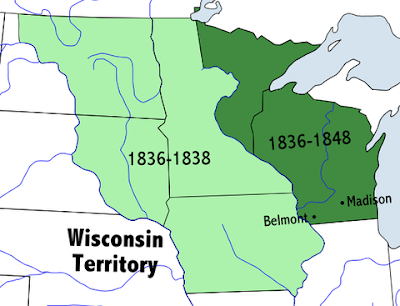HISTORY
The first European known to have landed in Wisconsin was Jean Nicolet. In 1634, Samuel de Champlain, governor of New France, sent Nicolet to contact the Ho-Chunk people, make peace between them and the Huron and expand the fur trade.
Nicolet founded a small trading post there in 1634, originally named La Baye or La Baie des Puants (French for "the Bay of Stinking Waters"). Nicolet's settlement was one of the oldest European permanent settlements in America.
 |
| Jean Nicolet's 1634 landing in Wisconsin |
Early French voyagers exploring Wisconsin waterways bartered for cranberries with the Native Americans.
Great Lakes fur trader Charles Michel de Langlade is generally recognized as the first settler, establishing a trading post at Green Bay in 1745.
The British gradually took over Wisconsin during the French and Indian War, taking control of Green Bay in 1761 and gaining control of all of Wisconsin in 1763.
The United States acquired Wisconsin in the 1783 Treaty of Paris. Four years later, in 1787, the Americans made Wisconsin part of the new Northwest Territory. Later, in 1800, Wisconsin became part of Indiana Territory.
Wisconsin Territory was created by an act of the United States Congress on April 20, 1836. The new territory initially included all of the present day states of Wisconsin, Minnesota, and Iowa, as well as parts of North and South Dakota.
The word Wisconsin comes from the name that one of the Algonquian speaking American Indian groups living in the area gave to the Wisconsin River. They named the Wisconsin River at the time that the European contact happened.
 |
| Map of Wisconsin Territory 1836–1848. Wikipedia |
By the fall of 1836, the best prairie groves of the counties surrounding Milwaukee were occupied by New England farmers.
Wisconsin was admitted as the 30th U.S. State on May 29, 1848. The state's constitution is the oldest of any state west of the Allegheny Mountains. It was adopted in 1848.
Wisconsin was the last state entirely east of the Mississippi River (and by extension the last state formed entirely from territory assigned to the U.S. in the 1783 Treaty of Paris) to be admitted to the Union.
The Republican Party was founded on March 20, 1854 in a little white schoolhouse in Ripon, Wisconsin.
 |
| The Little White Schoolhouse, in Ripon, 1854, By Royalbroil |
In 1856, Margaretta Schurz, wife of the politician Carl Schurz, established the first kindergarten in the United States, in Watertown, Wisconsin.
The Peshtigo Fire took place on October 8, 1871 in and around Peshtigo, Wisconsin. The wildfire consumed an area twice the size of Rhode Island, It was the deadliest forest fire in recorded history, with estimated deaths of around 2,000 people.
In 1882 the first hydroelectric plant in the United States was built at Fox River in Appleton, Wisconsin. Named the Vulcan Street Plant, the hydroelectric central station served both private and commercial customers.
During the 19th and early 20th centuries, a large number of European settlers entered Wisconsin, many of whom emigrated from Germany and Scandinavia. The state remains a center of German American and Scandinavian American culture.
FUN WISCONSIN FACTS
Wisconsin is the 23rd largest state by total area and the 20th most populous.
The state capital is Madison, and its largest city is Milwaukee, which is located on the western shore of Lake Michigan. 33 percent of the population of Wisconsin lives in the Greater Milwaukee area.
The state has 7,446 streams and rivers. End-to-end they'd stretch 26,767 miles (43,077 kms).
Timms Hill is the highest natural point in Wisconsin at 1,951.5 ft (594.8 m); it is located in the Town of Hill, Price County.
 |
| Timms hill. By Skye Marthaler |
The state leads the nation in exports of cranberries. Infact, Wisconsin currently produces half of the world’s cranberries, creating 3,400 local jobs.
Wisconsin also leads the nation in exports of ginseng root. The city of Wausau is the ginseng capital of the world.
In Wisconsin, livestock always has the right of way when crossing a street.
Wisconsin is the dairy capital of the United States. It produces more milk than any other state.
The state has the most cheesemaking plants in the U.S. with 90 percent of Wisconsin's milk being made into cheese—about 2.8 billion pounds per year.
The city, Monroe, hosts an annual cheese festival in September, Green County Cheese Festival, for cheese enthusiasts.
 |
| Wisconsin landscape dairy farm |
In Wisconsin, the word people most often google ‘how to spell' is ‘Wisconsin'.
Wisconsin have more bars than grocery stores. The state has the same number of bars as California despite a population that's 85% smaller. One bar for every 1,862 residents compared to California's one for every 11,962 residents.
There are only four authentic Thai pavilions built outside of Thailand. One of them being in Madison Wisconsin. It was a gift to the University of Wisconsin-Madison from the Thai government for the large Thai student population. The pavilion does not contain any screws or nails of any kind.
In Wisconsin, children are legally permitted to drink at any age, even in public, so long as a legal guardian gives the OK.
Green Bay, Wisconsin has a population of 100,000. Its American Football team, The Green Bay Packers is the only non-profit, community-owned major league professional sports team in the United States.. Every Green Bay Packers home game at Lambeau Field has been sold out since 1960 and the wait time for season tickets is 30 years.
 |
| Lambeau Field Stadium. By T Lordmontu at English Wikipedia. |
The Tug of War International Federation, the international governing body for the sport of tug of war, is based in Orfordville, Wisconsin.
With an average of 2,500 performers, Milwaukee's Summerfest is the nation's largest music festival. The Summerfest, held annually on the lakefront for 11 days in the end of June, attracts nearly a million visitors every year.
Sources Femalefirst
No comments:
Post a Comment